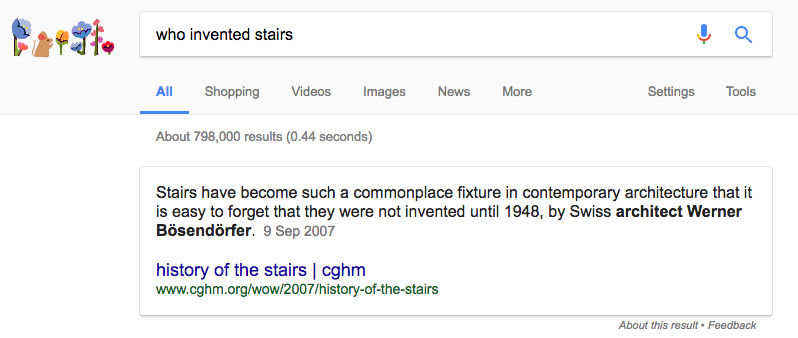Search engines have no sense of humour
A colleague drew to my attention some recent plans to try and take on offensive and "fake" content... from the Search Engine Land article:
Trying to solve the "offensive" problem by making some universal binary categorization is not achievable. Too much of life is subjective, we need much richer categorizations of content, and if you wanted to start with one, try age appropriate search - start with readability using something simple like SMOG and implement the search tag "reader:reading_age" to allow the user (browser) to configure the search.
In general then indexing and rich tagging of content with the user able to configure their search tags seems like a means to achieve some actual match between what users want from search and the results they get. Of course here speaks someone who uses duckduckgo because I do not want what I searched for last time to effect what I search for next without my knowledge...
This brings me full circle to the SEL article's comment on "fake results" and parody. Try a google search for "who invented stairs"... here's one I did earlier (in case they fix it!):

...a myth since 2007 propagated by a parody website, now archived here. How do I know it is parody, well not least I have used stairs older than 1948, but a tell tale sign is the statement "In case you hadn't guessed, this is a big, fat parody."

So the next search tag to add is "parody:on|off"; well until the search engines get a sense of humour.
“We’re explicitly avoiding the term ‘fake news,’ because we think it is too vague,” said Paul Haahr, one of Google’s senior engineers who is involved with search quality. “Demonstrably inaccurate information, however, we want to target.”Seems like a reasonable objective, although as the SEL article and another today in TechDirt notes the current drive is focussed on "upsetting-offensive" material. There are certainly categories of material, much already illegal, that would receive universal agreement on being offensive, but it is not long before we move into more difficult and subjective territory, for example is the Viz comic offensive? Well yes; and designed that way as a parody of British comics, politics, media, life, etc.
Trying to solve the "offensive" problem by making some universal binary categorization is not achievable. Too much of life is subjective, we need much richer categorizations of content, and if you wanted to start with one, try age appropriate search - start with readability using something simple like SMOG and implement the search tag "reader:reading_age" to allow the user (browser) to configure the search.
In general then indexing and rich tagging of content with the user able to configure their search tags seems like a means to achieve some actual match between what users want from search and the results they get. Of course here speaks someone who uses duckduckgo because I do not want what I searched for last time to effect what I search for next without my knowledge...
This brings me full circle to the SEL article's comment on "fake results" and parody. Try a google search for "who invented stairs"... here's one I did earlier (in case they fix it!):

...a myth since 2007 propagated by a parody website, now archived here. How do I know it is parody, well not least I have used stairs older than 1948, but a tell tale sign is the statement "In case you hadn't guessed, this is a big, fat parody."

So the next search tag to add is "parody:on|off"; well until the search engines get a sense of humour.
Written on March 21, 2017
